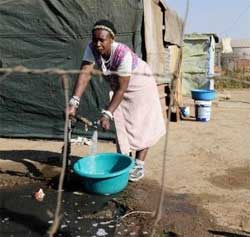SA's water crisis in danger of deepening

The paper Parched Prospects: The Emerging Water Crisis in South Africa by Institute of Strategic Studies (ISS) consultant Steve Hedden and ISS Executive Director Dr Jakkie Cilliers, argues that South Africa is already over-exploiting its freshwater resources on a national level and that water demand is growing faster than reliable supply.
"This means that over-exploitation will only increase in the future," said Cilliers.
The African Futures project is a partnership between the ISS and the Frederick S. Pardee Centre for International Futures at the University of Denver. The International Futures (IFs) forecasting software from the Pardee Centre is used to model and provide a forecast for water supply and demand from now until 2035 for the agriculture, industrial and municipal sectors.
"Our forecasts show that the current gap between supply and demand will increase throughout this time even with the policy interventions currently proposed in the latest National Water Resource Strategy," claimed Cilliers.
The strategy was released by the Department of Water Affairs in 2013.
Over-exploitation of water

The analysis shows that over-exploitation of water resources will be a constraint on the implementation of the National Development Plan (NDP), limit economic growth and leave South Africa vulnerable to changes in water supplies caused by natural events such as droughts.
Four pillars of action are needed to ensure a water secure future for South Africa according to Dhesigen Naidoo, Chief Executive of the Water Research Commission who also spoke at the seminar.
"These pillars are a strong science, technology and innovation knowledge base to provide sustainable solutions; good water infrastructure; excellent human capital to manage our water systems, and a major correction in our wasteful water behaviour - both at personal and a corporate level," he said.
The authors of the African Futures paper argue for aggressive interventions, especially in demand management. they claim that only in this way will South Africa be able to reconcile water demand with reliable supply.
Cilliers presented the 'Closing the Gap' scenario that outlines the increases in supply and decreases in demand that will be required to achieve this goal.






















